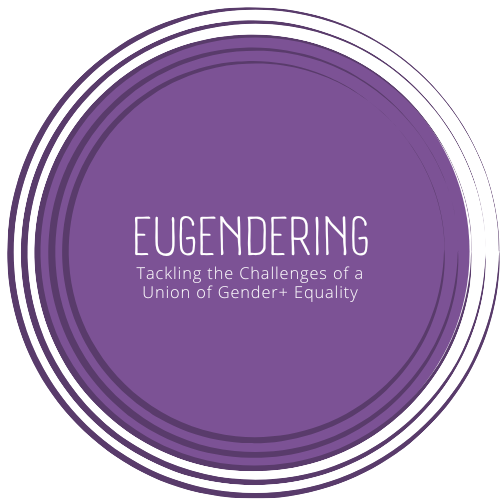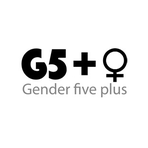Gender Five Plus (G5+) is represented in the Board of EUGENDERING by its President, Agnès Hubert. However, all the members of G5+ take part in the activities (“Model EU think tank” teaching activity and the jury of the EUGENDERING Prize for Best Graduate Student Research Paper.) Gender5+ also participates to the organisation and animation of the EUGENDERING Public Debates with policymakers and stakeholders.
G5+ is the first independent European Feminist think tank, committed to European integration and a future built on gender equality, respect for human rights and sustainability.
G5+ develops and supports innovative feminist research as well as roundtable discussions organized all over Europe between relevant stakeholders and European and national decision-makers. Such roundtables discuss G5+ research and/or policy papers looking a issues like violence against women, Brexit, the concept of parity democracy, the impact of COVID or the Conference on the Future of Europe from a gender perspective. Is there equal treatment? And if not, what needs to be done to ensure equality?
G5+ reaches out and builds alliances with women, networks, research institutes, and European institutions such as the European Parliament in order to carve out that space which is necessary for developing creative and respectful solutions.
The core membership of the think tank is composed of a mixture of experienced EU policymakers and young academics and is advised by a group of honorary members from academia and politics.
Euroïnes is a podcast co-founded by Margaux Cognard and Fanny Devaux to support the voice of women working at the EU level.
EUroïnes is represented in the Board of EUGENDERING by Margaux Cognard. Euroïnes produces and broadcasts the podcast episodes. Euroïnes also participates to the organisation and animation of the EUGENDERING Public Debates with policymakers and stakeholders.
Throughout the interviews of women working in the EU bubble, Euroïnes gives an understanding of what women live while working in a power sphere like Brussels, what the EU is bringing to them, but also try to identify their challenges. They interview different types of profiles and bring a focus on the inequalities they are encountering in the work environment.
Margaux Cognard holds a master’s degree in European Governance from Sciences Po Grenoble and graduated from the College of Europe (European political and governance studies). After an experience in the EESC and as policy officer in EURATEX in Brussels, she works now as a academic assistant in the European General Studies Program in the College of Europe and a as Strategic Communication Officer in the College of Europe.
Fanny Devaux holds a BA’s degree in political science from McGill University in Montréal and a Master’s degree from Sciences Po in Paris. She has experience in working as a parliamentary assistant both at the national and European level.


